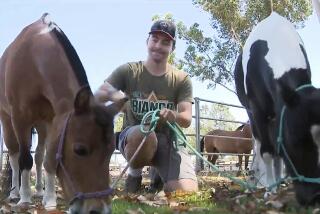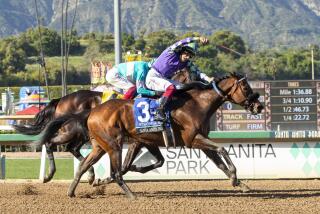Charges of Low Bids, Insider Trading Cloud College Horse Sale : Auction: Only 17 animals from Moorpark stable remain. Would-be buyers complain that the others were sold earlier to officials’ friends for far too little.
- Share via
Despite recent assurances that Moorpark College still owned 40 horses for its equestrian program, the college president said this week that most of the animals have now been sold without appraisals or public bidding.
As a result, the taxpayer-owned horses that equestrians say could have fetched $2,000 each at a public auction were sold to insiders for as little as $300, officials say.
Only 17 of about 40 horses in the program earlier this year are still available for sale to the public, Moorpark College President James Walker told Ventura County Community College District trustees Tuesday.
The others all were sold this spring and have been transported to buyers. But at least a dozen of those animals have not yet been paid for, he said. Walker said he did not know why the college allowed buyers to pick up the horses without paying for them first.
Meanwhile, college district Chancellor Thomas G. Lakin said district lawyers say the sales contracts are non-binding because the governing board never gave Program Director Don Anderson permission to sell the animals. But trustees have not decided whether to try to get them back.
“The only way the district can get that property back is to sue,” Lakin said.
But several Ventura County residents are angry that they had no chance to buy the horses, which originally were donated to the college or bred in the equine program.
Anderson, whose June 30 retirement caused closure of the 26-year-old riding-and-training program, has said that he sold or agreed to sell the horses for an average of $350 each. He said he determined the values based on his decades of experience in the horse business.
Potential buyers complained that the horses are worth much more and accused the program director of selling the horses to his friends at a fraction of their market value.
“I don’t know who would pay to transport a horse worth only $300,” said Neil Jensen, an Oxnard rancher who wanted a chance to buy some of the horses. “Even up north, you can’t touch a good saddle horse for less than $2,000.”
Anderson, who lives at the Newbury Park ranch where he ran the program, was not available for comment on Wednesday. But he said last month that he negotiated the highest possible price for the animals. He said he sold the horses with permission of college administrators and that he had feared the animals might end up being slaughtered and turned into dog food.
Tuesday night, the district trustees declared the remaining horses surplus property and approved a sealed-bid auction for July 15.
The district is planning to advertise the auction. And administrators have proposed a set of qualifications to weed out buyers who would sell the horses for their flesh.
A district committee made up of Anderson, Newbury Park horseman Jim Frazier, Jeff Alexander of the Thousand Oaks Corral and Kay Skeeters of the Ojai Valley Farms was formed to set the value of the horses and conduct the auction.
Some of the bidding criteria include riding experience, the proposed use of the horse, a description of the buyer’s stable and a list of personal references.
“A determination will be made by the committee whether that individual (bidder) is acceptable,” Walker said.
But Michelle Erich, a Port Hueneme attorney whose daughter, Shyla, participated in the equine program last year, said the auction rules are skewed against people outside the district.
“In screening prospective buyers, I see a real potential for misuse,” she told trustees. “I think a lot of people with friends on the committee are going to find horses at a good price.”
Walker said after the board meeting that certain revisions will be made to the bidding application to ensure that everyone gets a chance to bid on a horse.
During the meeting, Walker said proceeds from horse sales have always gone into a special fund at Moorpark College. But he noted that the college has not yet received payment from a Utah rancher who purchased at least a dozen of the animals.
Anderson sold scores of horses belonging to the Moorpark College Equine Program over the years without keeping track of how much he received for each animal, Walker said.
Frazier, an independent horse appraiser brought in by Anderson, estimated that they are worth an average of $385, still far below what some horse owners say they are worth.
“Pick up a Horse Trader and find me a horse for $300 that’s rideable,” said Erich, who wanted to buy a chestnut quarter horse called Royal for $1,000.
“My daughter was told (Royal) was 12,” Erich said. “She described him as a ‘push button.’ Now I’m told he needs an experienced rider, he has no trail experience and that he shies easily.”
Anderson said last month that Royal was 18 and worth only $300. A subsequent appraisal by Frazier said the quarter horse was instead 20 and worth up to $450.
More to Read
Sign up for Essential California
The most important California stories and recommendations in your inbox every morning.
You may occasionally receive promotional content from the Los Angeles Times.













